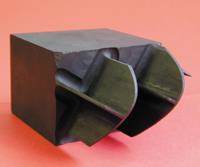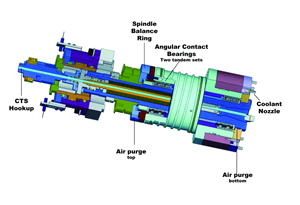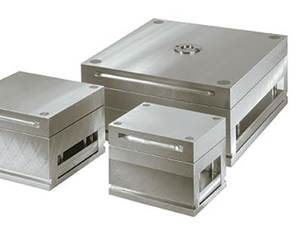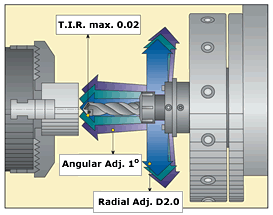Don't Panic When Cutting Tools Fail!
Shop remanufactures cutting tools quickly and to specifications during a tool break in your production line.
Dayton, OH-based Greene Tool Systems, Inc. has found its calling - saving moldmakers' necks when there's a critical tool break in a production line. The 15-year old company specializes in re-grinding, or remanufacturing, specialty drills and endmills to the original manufacturer's specifications, according to president Tom Greene. And, if needed, the tools can be turned around in just a few days.
"We call this edge-of-panic delivery," Greene states. "When we quote a job we quote a normal three-week delivery, then we have a one-week delivery, and we also offer 72-hour edge-of-panic delivery. When the customer is down and he needs a tool, if they are a regular customer of ours, we can turn tools around extremely fast. We've done special ballnose endmills or special corner radius cutters in less than six hours - and that's manufacturing them from scratch. It's not cheap, but we're easy! We run a loose schedule on two shifts, which allows us to break in when we have to and a lot of our customers take advantage of this.
"Our main thrust is in remanufacturing cutting tools - solid carbide cutting tools like ballnose endmills and corner radius endmills," Greene continues. In addition, the company remanufactures solid carbide drills, standard end mills, carbide round tools, drills, taps, special form tools, special form cutters and custom tools.
The Cutting Tool Dilemma
"Throughout the years we have found that mold builders will buy new cutting tools and then run them in jobs where they're cutting a cavity or cutting graphite electrodes," Greene explains. "Then, when it comes time to regrind them they can't find anybody who has the equipment that is equal to the original manufacturer of the tools. Sometimes they would send them back to the manufacturer, but often they don't use them again or they have them manually ground and use them for roughing.
"That's where we come into the picture as a remanufacturer," he continues. "We have the same equipment or better to manufacture all of those tools. Our best-selling tools with moldmakers are our remanufactured ballnose endmills. If a moldmaker pur-chases a half-inch endmill for $35.00, he will probably use it once and then put it in a box and not regrind it, because he usually can't get the radiuses close enough for precision work. I'll regrind it for a fraction of the cost of a new endmill.
"We will ask the customer what he wants for a radius and we grind that tool, check it and supply the moldmaker with charts that show what the exact radius is - and we guarantee those radiuses to be correct. We find that when we check tools from manufacturers it's common to find them out of tolerance before they are even used."
Technology Triumphs
Greene Tool Systems accomplishes this feat by using the technology of Walter Grinders (Fredericksburg, VA), an inspection equipment manufacturer, and interfacing it in a network with its own technology. "We have taken this advanced technology further than anybody else," Greene affirms. "Our reinspection services ensure that the cutting tools are exactly to the manufacturer's specifications or better. We have a very unique optical measuring system for quality and it's tied to the machine through a fiber optic network. That way, you can check your parts and download the offsets of the machine. It gives us a very distinctive edge.
"One automatic loader works 24 hours per day," Greene continues, "and we have five grinding engineers. First, we program the tool's geometry into our CNC machine's computer. Then, we grind the tool - we do not use manual grinders. Everyone has a lot of experience with cutting tools, and people that we pick to work in our shop have to be crazy and see things a little bit differently - we don't do things conventionally! We are definitely outside of the box with the way we manufacture. Finally, we electronically inspect each tool for perfection of grind."
Presently, the common method of inspecting a ballnose endmill is with an optical comparator, notes Greene. "We used to check our tools this way, and what we found is since there's a helix going through the ball, that it was extremely difficult to accurately measure the radius on that tool because you have to roll the tool through the radius to check it," he states. "We searched a long time for a way to do this, and that's when we went to Walter Grinders. They had the only method that we could find of checking the tool as the ball rotates through the helix and giving us a true reading within microns of what the radius is on that ballnose endmill.
"In a nutshell, I personally don't believe you can check a ballnose endmill without using some sort of an optical system that measures a lot of points throughout the helix," Greene adds.
A Savvy Solution
According to Greene, in some cases his customers have gone an entire year without buying a new tool. "It's an incredible savings!" Green enthuses. "Moldmakers are finicky people with just cause to be - everything they do is precise and they have to be detail-oriented. When you're cutting a cavity in a big mold, the tool has to be right. Once we get customers, it's not uncommon to get orders to remanufacture 200 to 300 endmills per month. And, if the customer needs recoating or diamond coating we simply outsource this work. We can get any type of coating."
Moldmakers should ask questions of their vendors, such as how the tools are inspected and certified, Greene advises. "In this day and age we find that a lot of moldmakers don't care as much about price as they do about quality," he states. "That's the key. You have to build a relationship with your supplier to assure that they will produce what they tell you they are producing. Ask to take a tour of their facility."
Greene sums things up succinctly. "Why would moldmakers take a good piece of carbide and throw it away when it can be remanufactured for a fraction of the cost 10 to 15 times?"
Related Content
Advantages and Disadvantages of Copper and Graphite Electrodes
Both copper and graphite provide approximately the same end result, so it is important for a shop to consider the advantages and disadvantages of each material in order to discover what would work best in their shop floor environment.
Read MoreHands-on Workshop Teaches Mold Maintenance Process
Intensive workshop teaches the process of mold maintenance to help put an end to the firefighting culture of many toolrooms.
Read MoreMachining Center Spindles: What You Need to Know
Why and how to research spindle technology before purchasing a machining center.
Read MoreConsiderations for Mold Base Material Selection
Choosing the right material can greatly affect the profitability and cost of your application.
Read MoreRead Next
Cutting Tools Enable Shop To Substantially Reduce Cycle Times
A Wisconsin automotive component manufacturer recently faced a chip control problem on an ID turning operation.
Read MoreAre You a Moldmaker Considering 3D Printing? Consider the 3D Printing Workshop at NPE2024
Presentations will cover 3D printing for mold tooling, material innovation, product development, bridge production and full-scale, high-volume additive manufacturing.
Read MoreHow to Use Strategic Planning Tools, Data to Manage the Human Side of Business
Q&A with Marion Wells, MMT EAB member and founder of Human Asset Management.
Read More
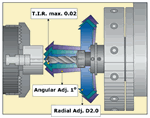









_300x250 1.png;maxWidth=300;quality=90)









.jpg;maxWidth=300;quality=90)
